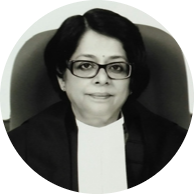Indu Malhotra

Indu Malhotra
Former Judge of the Supreme Court of India
Assumed Office27th Apr, 2018
Retired On13th Mar, 2021
Previously
Senior Advocate at Supreme Court 2007- April 26th 2018
Profile
Career as an Advocate
Justice Malhotra began her legal profession in 1983 and she specialises in arbitration law. She was empanelled as an Arbitrator with the Indian Council of Arbitration and served as a member of the High-Level Committee appointed to review the Institutionalisation of the Arbitration Mechanism in India. She has authored the 2014 edition of the commentary The Law and Practice of Arbitration in India.
Career as a Judge
In April 2018, Justice Indu Malhotra became the first woman to be directly appointed to the Supreme Court from the Bar. She is the seventh woman to be a judge of the Supreme Court, and the second woman to be designated as a Supreme Court Senior Advocate. Justice Malhotra joins Justice R Bhanumathi and Justice Indira Banerjee to form the highest number of women judges (three) in the Supreme Court during a Chief Justice’s tenure.
In 2019, Justice Malhotra was on the 3-member committee inquiring into the sexual harassment allegations against Chief Justice Ranjan Gogoi. This committee did not find any substance in the complaint and did not publicly release its findings. Justice Malhotra had previously been appointed to the Supreme Court’s committee to look into complaints of sexual harassment within its precincts, per the 1997 Vishakha guidelines.
Post-Retirement
In September 2021 the Delhi and Districts Cricket Association appointed Justice Malhotra as their ethics officer and ombudsman.
On January 5th, 2022, Prime Minister Narendra Modi’s entourage in Punjab was the victim of a major security lapse as a farmers protest blocked the road and left him stranded on a flyover. A week later, on January 12th, the SC appointed a committee led by Justice Indu Malhotra to investigate the incident and determine who should be held responsible. In August 2022, the panel indicted the Senior Superintendent of Police in Ferozpur for alleged negligence that contributed to the incident.
Notable Judgments
In Navtej Singh Johar v Union of India, the Supreme Court struck down Section 377 of the Indian Penal Code and decriminalised same-sex relations between consenting adults. Justice Malhotra stated that ‘History owes an apology to the members of this community and their families, for the delay in providing redressal for the ignominy and ostracism that they have suffered through the centuries. The members of this community were compelled to live a life full of fear of reprisal and persecution.’
In a separate concurring opinion in Joseph Shine v Union of India, Justice Malhotra struck down Section 497 of the Indian Penal Code as unconstitutional for violating Articles 14, 15 and 21 of the Constitution. She held that while adultery is a morally wrong civil offence, it does not negatively impact society to the extent that it remains a criminal offence.
Justice Malhotra wrote the sole dissenting opinion in the Indian Young Lawyers’ Association v State of Kerala (Sabarimala Temple Entry case). She held that the right to equality under Article 14 does not override the fundamental right to religion under Article 25, irrespective of whether the religious practice falling under Article 25 is rational. She questioned the entertainment of the Writ Petition since the petitioners were not worshippers of the Sabarimala temple and lacked standing.
In Public Interest Foundation v Union of India, the Supreme Court ruled that it cannot disqualify candidates against whom criminal charges have been framed from contesting elections. The Court recommended that the Parliament enact laws to curb the criminalisation of politics. It issued directions to aid in combating the criminalisation of politics.
In Jarnail Singh v Lachhmi Narain Gupta the Supreme Court ruled that the 2006 Nagaraj judgment need not be referred to a seven-judge Bench. However, it invalidated the conclusion in the Nagaraj judgment that the State collected quantifiable data to show the backwardness of Scheduled Castes and Scheduled Tribes.
